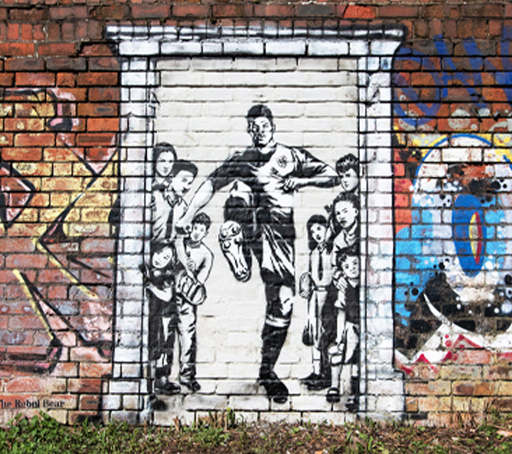3.1 How Marcus Rashford used his voice
There are all sorts of ways in which you can break the mould and find your own voice. Your voice will be unique to you, shaped by your values, your community or where you grew up, and your experiences in life. Look at the following example of how the footballer Marcus Rashford, used his voice.
‘As a Black man from a low-income family in Wythenshawe, Manchester, I could have been just another statistic. Instead, due to the selfless actions of my mum, my family, my neighbours, and my coaches, the only stats I’m associated with are goals, appearances and caps. I would be doing myself, my family and my community an injustice if I didn’t stand here today with my voice and my platform and ask you for help’.

In 2021 at the age of 22, Marcus Rashford was named by Time Magazine as one of Next 100 most influential people to change the world. Marcus is a professional footballer from Manchester in England and an anti-poverty activist. He grew up in South Manchester, on what was once the largest council housing estate in Europe. His mum Melanie, a single parent, worked three jobs to support the family, but still struggled to put food on the table. Marcus and his brothers and sisters, like many others in their community, were often hungry growing up and relied on breakfast clubs and free school meals. This experience shaped his choices, his values and his activism as an adult.
‘Thank you for sticking up for our kids who needed a voice, here on Merseyside and across the country.’
In March 2020, during the first COVID-19 lockdown, schools were closed across the UK and in many other countries around the world too. In response Marcus used his twitter account to highlight the food poverty crisis facing families across the UK, many of whom had relied on free school meals. He set up the Child Food Poverty Task Force and raised £20 million pounds for the FareShare charity providing food for foodbanks and meals for struggling families. But Marcus also realised food poverty was a bigger social issue and that it needed a political solution. Drawing on his own experiences of hunger as a child, he wrote a public letter to MPs which he shared on twitter putting public pressure on the British Prime Minister to continue to provide free school meal vouchers to 1.3 million children during the school holidays. Marcus followed up with a campaign to extend the voucher scheme into the winter and won. He continues to campaign for struggling families today. His community has put up murals in his honour. His work has even united rival football communities across the country who value the work he does for all struggling families.
Activity 5: Marcus Rashford’s story
Now watch this short film [Tip: hold Ctrl and click a link to open it in a new tab. (Hide tip)] about Marcus Rashford. Based on what you read and on watching this film, answer the following questions:
- How has Marcus’s personal experience shaped his understanding of food poverty?
- How does he use his voice for communities with similar experiences to his?
- What if anything from his story inspires you to use your own voice?
Discussion
In this short film, Marcus explains why he took the actions he did. He talks about his desire to wake people up to child food poverty. He makes connections to the Covid Pandemic and the response to it at a government and policy level and asks why the same hasn’t happened in tackling child food poverty. Your response to this film and how Marcus Rashford’s story inspires you will be personal to you.
Everyone’s voice, including yours, is unique and when you find your voice it will be shaped by your experiences and underpinned by your personal values. Identifying these values is what you will be looking at next.
